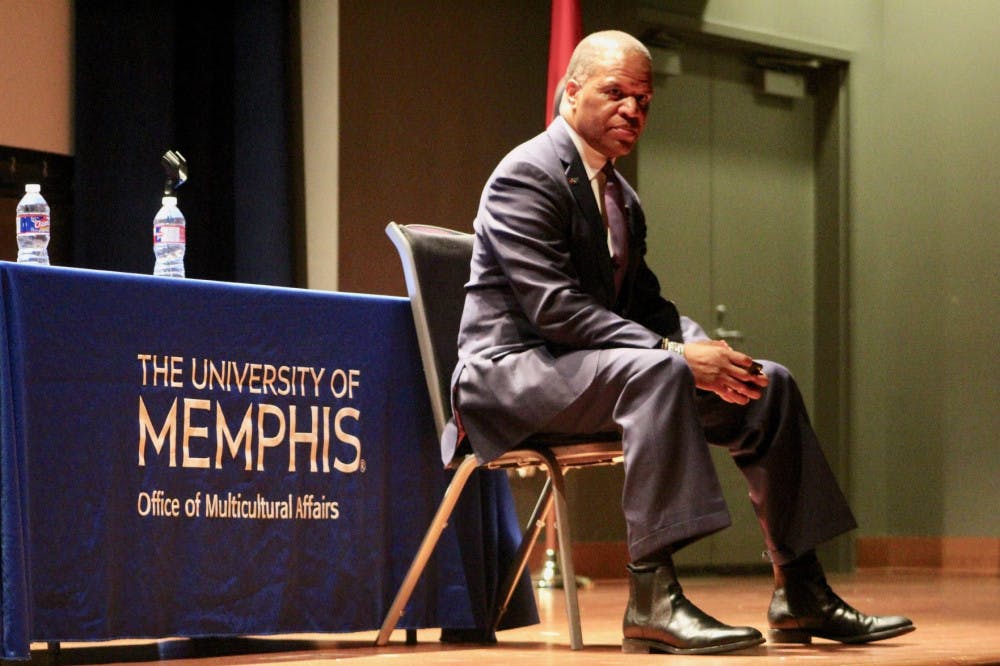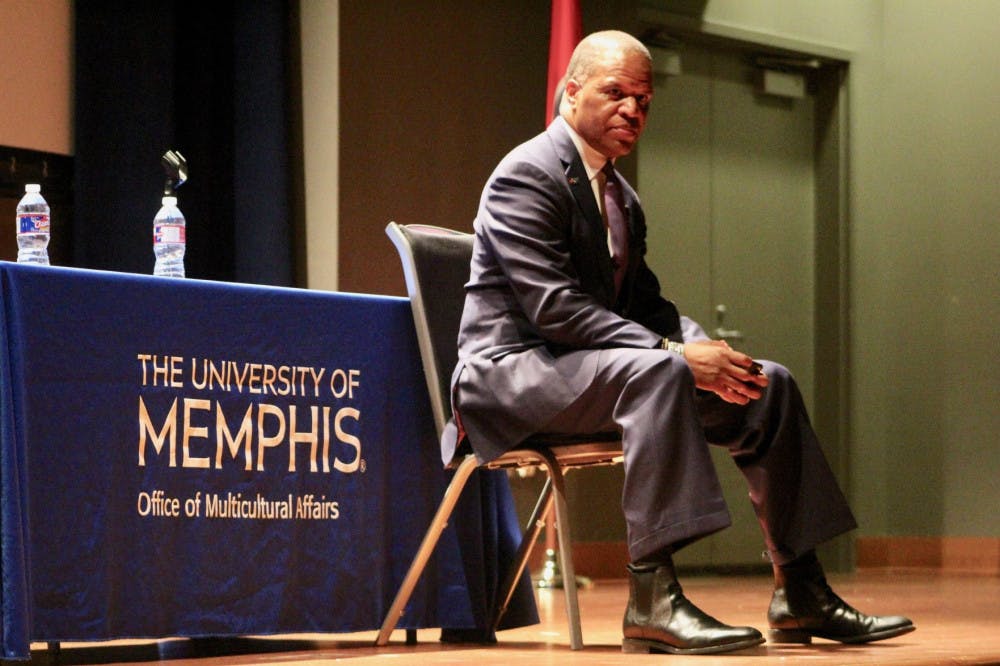
John Hope Bryant, the CEO and founder of Operation HOPE, spoke at the University of Memphis on Tuesday about the importance of economic literacy.
Andrew Young, a diplomat, politician and civil rights activist educated audience members about economic empowerment and literacy and showcased a documentary, “The Color of Money,†on Tuesday afternoon.
Young is a global spokesman for Operation HOPE, a non-profit organization that teaches financial literacy. “The Color of Money†marks Young’s 11th year of the nationally syndicated series, “Andrew Young presents†and was show in the UofM’s University Center Theatre. John Hope Bryant, the CEO and founder of Operation HOPE, was a guest speaker at the event.
“The event was held to bring about economic empowerment because of the importance of diversity and inclusion,†said Harry T. Cash, the UofM’s assistant director of multicultural affairs.
This year’s latest installment focused on Martin Luther King Jr.’s dream of financial inclusion and the continuation of the Poor People’s Campaign, which is being coordinated through the economic empowering work of Operation HOPE.
Taking the 750-credit score was advocated by bank executives in the documentary and Bryant, the founder and author, had more to add.
“When you get a 750-credit score you just got an education,†Bryant said. “Education is your freedom. It’s like a rubber band; once you’re expanded you never return to your original size. So, education and access to capital will set you free.â€Â
Bryant was born in Los Angeles, and raised in the neighborhoods Compton and South Central. A natural born go-getter, Bryant started his first venture when he was 10 in the den of his home from a $10 investment given to him by his mother.
The business would lead to Bryant netting $300 a week and eventually putting his neighborhood liquor store out of the candy business, which was mentioned in the documentary.
Bryant’s ambitious spirit would lead to him becoming a self-made businessman who overcame homelessness by adopting an self-assured and conservative perspective on poverty.
“I believed that if you weren’t working, you were lazy, and if you weren’t successful, get off your rear end,†Bryant said.
Bryant cited the 1992 Rodney King riots as the beginning of his own change of thought from the guilt he experienced. The pain, destruction, brutal injuries and deaths of the riots fully delivered Bryant to that epiphany and prompted him to join the board of directors of Rebuild L.A.
Through his determination for change he founded Operation HOPE in 1992, which focused on making free enterprise and capitalism work for the underserved. By 1994, Bryant would be listed as one of Time magazine’s “50 Leaders for America’s Future.â€
Under his slogan “silver rights,†Operation HOPE has aided over 2.8 million individuals worldwide, directed more than 2.7 billion economic activity for impoverished communities and branched itself into a variety of different organizations, which has helped him garner numerous awards and attention from investors.Â
Bryant’s previous and recent works have received attention from former United States Presidents.
Impressed with his work, Bill Clinton highlighted Bryant in his 2007 book “Giving: How Each of Us Can Change the Worldâ€and said, “John Bryant is a 41-year-old whirlwind of ideas and action. Lean, intense, focused and completely positive in his belief in the potential of poor people to prosper, with a hand up and not a hand out.â€
Today, Bryant’s vision now focuses on a local level.
“Embedding the model locally where I can see change and you can feel it in your body and your soul are my short-term goals,†Bryant said.
Bryant has began to achieve this local goal by partnering with SunTrust Bank and First Tennessee Bank with his HOPE Inside model, created by Operation HOPE, which is presented in the documentary as a mechanism of a no-cost financial literacy and education coaching.Â
Bryant still has the ultimate goal of his operation being the “Starbucks of financial inclusion, embodiment of the (President Abraham) Lincoln’s Freedmen’s bank and King’s Poor People Campaign, where you can go see coaches and get your financial dignity back.â€
In his speech, Bryant shared how both Lincoln’s and King’s campaigns compared, while the story of Fredrick Douglass’s financial literacy. Bryant spoke of the importance for individuals to search for scalable career paths outside of sports and music.Â
Bryant challenged the crowd to understand the difference between a 500-credit score and 700-credit score neighborhood.
“There’s never been a riot in 700-credit score neighborhood,†Bryant said.
Bryant also added that some individuals never received the memo of economic literacy, but he offers that advice in his book “The Memo: Five Rules of your Economic Liberation.â€
Ambitious and “fired-up,†a slogan he used to excite the crowd, as ever, Bryant also credited his success to his investors and staff.
“I personally have seen and helped people become homeowners, raised credit scores, and wipe out thousands of dollars of debt,†said Angelic Mister a financial coach for Operation HOPE.
Yvette Lippett, another associate of HOPE, said, “I just went to a customer’s ribbon cutting at his brick and mortar who went through our training program and had ideas.â€
More information regarding Operation Hope can be accessed through their website, OperationHope.org. Bryant’s books and newest book, “The Memo: Five Rules of your Economic Liberation,†can be found on Amazon.comÂ




